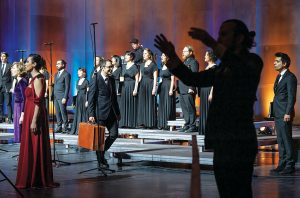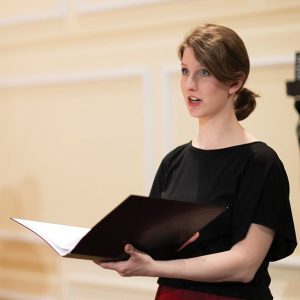Changing horizons of the choral world at the crossroads of West and East
Tisa Mrhar
The World Symposium on Choral Music took place in Istanbul from 25 to 30 April and was attended by more than 2500 singers from all over the world.
The World Symposium on Choral Music is a project of the International Federation of Choral Music. It has been held every three years since 1987, when it was first launched in Vienna. In 2020, choral music lovers were due to meet again in Auckland, New Zealand, but the Symposium was cancelled due to the pandemic. In 2023, the Symposium was then planned to be held in Qatar, only to be moved to Istanbul with the support of the Turkish Ministry of Culture and Tourism less than a year before the event was due to take place. This year’s gathering of experts from all over the world was thus held in a city of more than 15 million people, a multicultural crossroads of East and West. In this respect, the central theme of the Symposium “Changing Horizons” was an invitation to explore all the world’s musical cultures, to look for new developments and directions in choral music and, above all, to question all the existing (re)creative practices.

A lively festival from morning to evening
The festival’s rich programme consisted mainly of morning keynote presentations, lectures, workshops, meet-the-composer sessions, reading sessions, panels, roundtables, lounges, and the Expo during the first half of the day, while the afternoons and evenings were dedicated to concerts. The morning educational sessions offered a concise insight into a wide range of new developments in the field of choral music, but above all they provided an opportunity to learn about foreign musical cultures and their choral literature, and this is where the greatest charm of this year’s international gathering lay. The participants were particularly attracted by the diverse presentations of choral works from the Middle East and other lesser-known cultures, characterised by non-tempered systems and varied musical-theoretical frameworks.
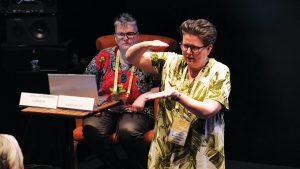
More than 55 choirs from all over the world
In Turkey, host of the World Symposium on Choral Music, choral singing was only established during the early years of the Republic, founded in 1923 by Mustafa Kemal Atatürk. The first organised forms of choral singing thus emerged in the 1920s and 1930s, with music schools and conservatoires certainly playing a major role in the development of choral singing. The first professional choirs were then established in the 1970s and 1980s, and at the turn of the 21st century, there was a full-scale expansion of choral singing, particularly in the context of amateur cultural societies established in all the major cities of Turkey. This year’s Symposium thus brought together more than 30 Turkish choirs of different genres.
In total, more than 55 choirs performed at the festival, during the afternoon concerts, while eleven selected ensembles also performed at the evening gala concerts in the newly renovated Atatürk Cultural Centre. The organisers made sure that the participating choirs represented all continents as equally as possible, making this year’s line-up was truly vibrant.
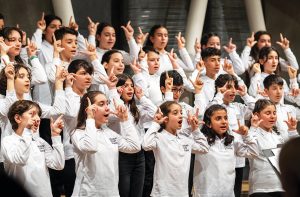
Two masterclasses led by renowned mentors
In parallel to the regular programme, two masterclasses were organised – a conducting masterclass with Ragnar Rasmussen and Lorenzo Donati, and a composition masterclass with Ko Matsushita. The first was also attended by Slovenian conductor Klara Maljuga, winner of last year’s 2nd National Competition for Slovenian Choir Conductors: “Spending several days under the watchful eye of excellent mentors and with sensitive choirs that respond to your every shortcoming is really the ideal scenario for conducting training. The seminar itself was so intense, my head was full of impressions. The days were really long and the nights too short. My free time I mostly used to get to know composers and their philosophies – especially since we, the conductors sometimes struggle with their contemporary pieces. I should not forget to mention the new friendships made, the exchange of scores, interpretation practices, didactic approaches, as well as life principles and the opportunity to refresh relationships with distant acquaintances.”
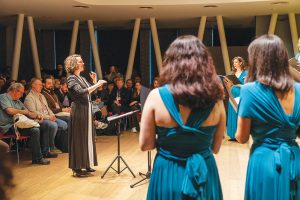
In addition, the fruitful discussions and newly forged friendships between composers and conductors were also highlighted by Zuzanna Koziej, Polish composer and arranger, living in Italy, who took part in the composition masterclass: “The Masterclass was a great opportunity to hear our own and our colleagues’ pieces performed, while also learning from the rehearsals and gaining insights into what is challenging to sing and what works best. We received valuable feedback from Ko Matsushita, our tutor, excellent Masis Gözbek, the conductor, but also from the singers, which is equally important to me. The chance to present our works in front of the participants of the WSCM was a great experience, offering possibilities for future projects and collaborations The part I enjoyed the most was the discussion with conductors participating in the Conducting Masterclass. We talked about the composer-conductor relationship and realized how little we know, but also how much we can learn from each other.”
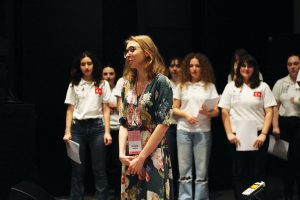
Training young managers
A new addition to the international festivals under the auspices of the International Federation for Choral Music is YOUNG, the Young International Cultural Management Programme. Organised for the second time in a row, this year it once again welcomed ten young individuals from all over the world. Upon arrival, they first attended an introductory two-day training course, where they learned about the organisation of the festival and each other, while acquiring additional management skills. They then joined the festival’s organising team, within which they were each assigned a specific task. This year, Jaime João, a student of choral conducting from Portugal, took part in the programme: “Being part of the YOUNG team in Istanbul was an unforgettable experience. Such a luck to be able to work with this many seasoned event organizers and musicians for more than two weeks, in a seemingly short window of time that more than allowed me to learn so many things about this world, making me feel like I can’t stop now, as if all the energy in the world was made available to me in order to find a way to bring home every part of this experience and everything I have learnt – and hopefully will keep on learning”.
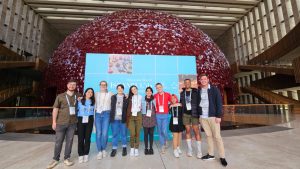
Until next time?
“I hugged many friends I had not seen in a while, met new inspiring people, learned a lot in keynotes and sessions and enjoyed wonderful concerts where I could not only hear the best choirs from different regions of the world but also very good Turkish choirs which were partly new discoveries for me. I look forward to hearing more of them, meeting them and Turkish conductors in international events across the globe and coming back to Türkiye where I now have many more friends who made our stay a great experience!” This is how Sonja Greiner, Secretary General of the European Choral Association, summed up her impressions of the symposium. Many more satisfied visitors came back home from Istanbul and the event will certainly have a positive impact on the development of the Turkish choral landscape and its surroundings, as Burak Onur Erdem, Festival Director, also pointed out: “From this moment on, Türkiye is one of the prominent centres of choral music. This festival has changed our horizons. Now we see the world with new eyes, we listen to it with new ears.”
Unfortunately, the future of similar meetings is rather uncertain, as hardly any country is financially ready to commit to organising such large cultural projects in the current uncertain situation. Besides that, these also require the work of a well-coordinated organising team over several years and many other inputs, but their positive short- and long-term effects make them indispensable in the current globalised choral world. Various platforms, festivals, symposia, and expos foster the development of the entire choral landscape, both locally and globally, and above all they enable all those who create it to maintain old and make new contacts, besides encouraging an open exchange of opinions and views, thus creating the harmony of our beautiful (musical) world.
